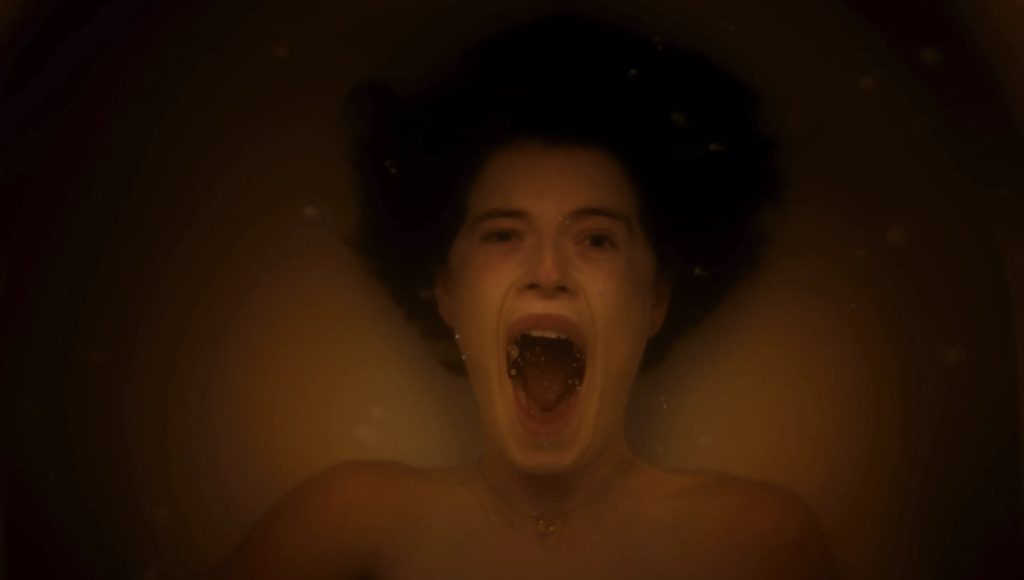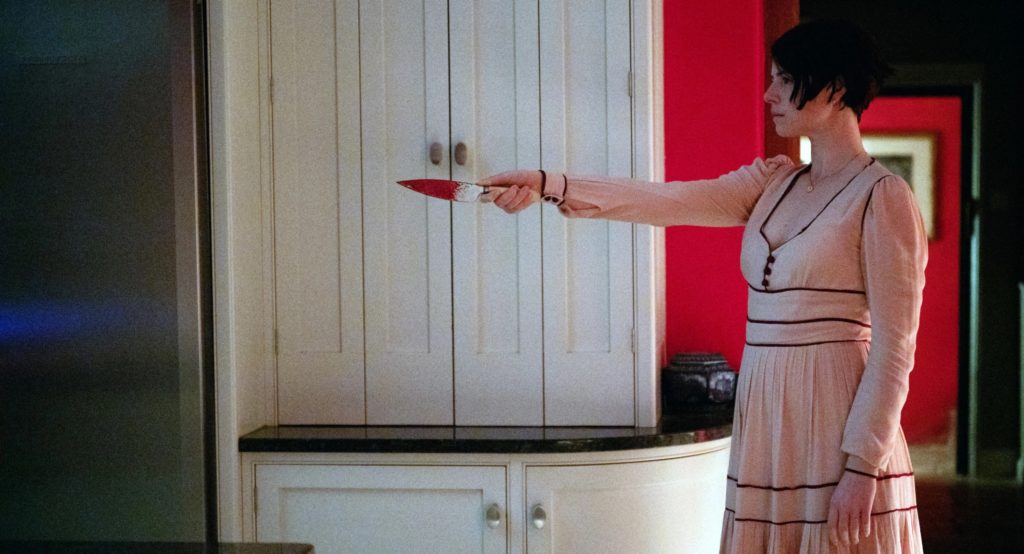Content warning: ‘Men’ does contain images of domestic violence and suicide. This review will speak to these scenes and ideas. Feel free to skip this review and the film if these issues are troublesome for you. You’re not missing too much… I promise.
This article contains spoilers for ‘Men’.
Not only was it an offence to the eyes, Alex Garland’s latest feature Men (2022) also provided an unintentionally laughable viewing experience to grotesque imagery.
How do I sum this up? Men is a horror film about a woman (haha) and the horrors that the past can cause. In an effort to process her past, Harper (Jessie Buckley) rents a polished and exorbitant homestead in the English countryside. The owner of the property, Geoffrey (Rory Kinnear), appears to be your classic country man as he takes Harper on a well fleshed out tour of the home. In the beginning, Men was calm.
And then a man fell from a window.

Harper remains haunted by her previous relationship, experiencing frantic, nonsequential flashbacks to her ex-husband, James (Paapa Essiedu), and their last encounter together. It’s clear that her marriage turned violent and spiteful towards the end. It was an environment that bred toxicity and the bitter end turned these once lovers into enemies. Her headspace is clearly impacted by the flashbacks as the pain still seems to plague her.
The visuals of her argument with James litter the entire film, and slowly build a picture of the trauma she runs from. James threatened to commit suicide if she left him and feeling trapped, Harper leaves him anyways. He jumps from the apartment above theirs and he locks eyes with Harper as he falls to his death. There was no escape from the same traumatic feeling Harper felt, as James’ fall played over and over. It made me feel uneasy, and not in the typical ‘horror film fun’ way. However, it was artistic and well inserted throughout the film, so if Garland wanted me to feel like I needed a cold shower and a hug after the flashbacks, he did achieve his vision!

Little to no music plays in the first act of the film until Harper reaches a tunnel. She harmonises with the birds, the sound of the dripping water and the echo of her own voice. Her joy seems to briefly free her from James and the violence that she once endured. The four note tune rings on, and on… and on. It bounces from the walls of the tunnel as she gleams in pride at her creation. It’s playful and I found myself enjoying the tune. Much like Harper, I needed some joy at this point in the film.
And yet just as I felt too comfortable, from the rocks at the end of the tunnel arises an unknown man. Maybe someone else is walking off their trauma too! The man, who is totally naked by the way, sprints towards Harper and she struggles to understand her reality. She documents some of this in photos as he continues to follow her no matter how fast she runs. Her once peaceful trip away is plagued by this naked man. With his, excuse me, penis hanging about, many in the audience began to laugh as it was distasteful as much as it was somehow not at all that scary. His presence in the background was laughable after the bit went on and on despite the very real horror this would cause anyone in real life.
And this is when I began to feel conflicted about the film.

Like most films I watch in the cinemas, I went in with no idea what I’m about to watch. In the opening minutes, I had interpreted the film as an exploration into the fear men cause women; a political piece taking a heavy stance on what it means to be a woman in the modern age. Maybe it was the recent overturning of Roe v Wade in the USA or the forever aura of misogyny in everyday life experiences, but I had my mind up. This was to be a deep film in which my life as a woman has prepared me to relate to the horror of Men.
And yet the film took a drastic downward spiral. I had to abandon any preconceived notions of the film and ask myself: ‘was my $10 ticket really worth this?’. If I was looking for artistry, social commentary, and seriousness? No. But if I was looking for an amazing laugh with my friends and honestly the entire cinema? Yes – absolutely.
From this point onwards, I struggle to articulate what happens next. Harper continues to meet different men along her journey, all of which are also played by Kinnear (on purpose). The group which I aim to call ‘The Men’, consists of a schoolboy, a priest, police officer and Geoffrey (the owner of the house) who chase her around the house as she loses all sense of reality. It only became clear to her and me that all ‘The Men’ were the same person when she sliced the hand of one of the men. As he reaches through the mail slot in the front door, she jams a knife into his forearm, and as he retracts his arm back through the mail slot the knife is dragged through his forearm, down his palm and out his fingers. The collective hand (and remember – they’re all the same person!) was then present in all ‘The Men’. It’s particularly notable that the priest choked her with one hand, two fingers on one side of her neck, and two on the other. Yes, they really did that.

And whilst that was absurd even by itself, each of ‘The Men’ THEN give birth to each other, metamorphosis style, slithering like a slug after each rebirth to follow her. The audience witnessed ‘The Men’, as fully grown adults, being born through their previous man’s newly grown vagina, their upper back and lastly their mouth. The final man that is birthed is Harper’s dead husband, James.
In complete and utter shock at what had occurred right in front of us, the jam-packed cinema audience we were with had descended into laughter and chatter at this point. Despite the truly unpleasant viewing experience – I was delighted in the unification of the audience against our new common enemy, the entire film Men.
And almost as if it couldn’t get worse, it just ended. After only 100 minutes (mind you that mainstream films like Spider-Man: Homecoming are 2 hours and more), Men ended with no real conclusion. Harper sits on the couch with her reborn husband and grieves the relationship she once had. Once day breaks, she rests outside alone and her friend, Riley (Gayle Rankin), comes to get her after her traumatic night. I expected all remnants of the battle, which seemed like a psychological breakdown, to be gone, and yet she is still covered in blood and there is still blood on the lawn. She smiles at Riley and it’s over. It is literally over.
Looking back, I can understand how her entrapment of ‘The Men’ could be representative of how society views women – yet at the time of viewing I was totally lost for words or an explanation of what the film was trying to say. I genuinely felt shell shocked.
Would I recommend the film? Maybe. For a fun gag, go for it. It was hilarious despite the gore, but if you’re looking for a horror film by A24 about a woman who is surrounded by men and then has a mental breakdown, just watch Midsommar. I promise you, it’s good. And much better than Men.
Written by Olivia Hough
Header image via IMDb


